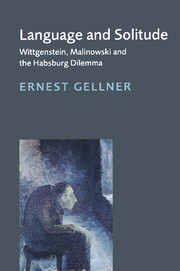Book contents
- Frontmatter
- Contents
- Preface
- Foreword
- Part I The Habsburg dilemma
- 1 Swing alone or swing together
- 2 The rivals
- 3 Genesis of the individualist vision
- 4 The metaphysics of romanticism
- 5 Romanticism and the basis of nationalism
- 6 Individualism and holism in society
- 7 Crisis in Kakania
- 8 Pariah liberalism
- 9 Recapitulation
- Part II Wittgenstein
- Part III Malinowski
- Part IV Influences
- Part V Conclusions
- General bibliography
- Bibliographies of Ernest Gellner's writings on Wittgenstein, Malinowski, and nationalism
- Index
4 - The metaphysics of romanticism
Published online by Cambridge University Press: 05 March 2010
- Frontmatter
- Contents
- Preface
- Foreword
- Part I The Habsburg dilemma
- 1 Swing alone or swing together
- 2 The rivals
- 3 Genesis of the individualist vision
- 4 The metaphysics of romanticism
- 5 Romanticism and the basis of nationalism
- 6 Individualism and holism in society
- 7 Crisis in Kakania
- 8 Pariah liberalism
- 9 Recapitulation
- Part II Wittgenstein
- Part III Malinowski
- Part IV Influences
- Part V Conclusions
- General bibliography
- Bibliographies of Ernest Gellner's writings on Wittgenstein, Malinowski, and nationalism
- Index
Summary
The model of man engendered by the empiricist/individualist tradition is very distinctive. The solitary Crusoe-like individual faces the world or, rather, assembles the world out of the accumulated bits of experience. He carefully sifts out impurities introduced into his experience by the pre-judgments, the prejudices of his social milieu. Within this world, his egoism has a curiously cold quality. In Kant this is made very explicit: to be moral is to abide by rules. Sin for Kant is the making of exceptions. This was the morality of the Prussian bureaucrat: Ordnung muss sein. But even in Hume, in whose thought morality is based on our sensibility rather than on our rationality, it is impartial feeling which is at the root of morals. So impartiality and symmetry, Ordnung, hence human universality rather than cultural specificity, is the basic message.
So the individualist/rationalist acts on principle. He deals with all like cases in a like manner – that is his honour. Clearly, this is a trustworthy reliable man, but not exactly exciting and stimulating. You might be pleased to have him as your bank manager, but be less thrilled to find him your dinner companion. A moral man, on this description, would display exactly the same sentiments in similar circumstances: to behave in any other manner would be to display partiality, asymmetry, arbitrariness, caprice, in fact all he abhors. Consider what this involves: it means that a decent man must love all similar objects – all landscapes, all countries, all poets, all women – in precisely the same manner and to the same extent, in as far as they possess the same relevant characteristics.
- Type
- Chapter
- Information
- Language and SolitudeWittgenstein, Malinowski and the Habsburg Dilemma, pp. 17 - 20Publisher: Cambridge University PressPrint publication year: 1998



